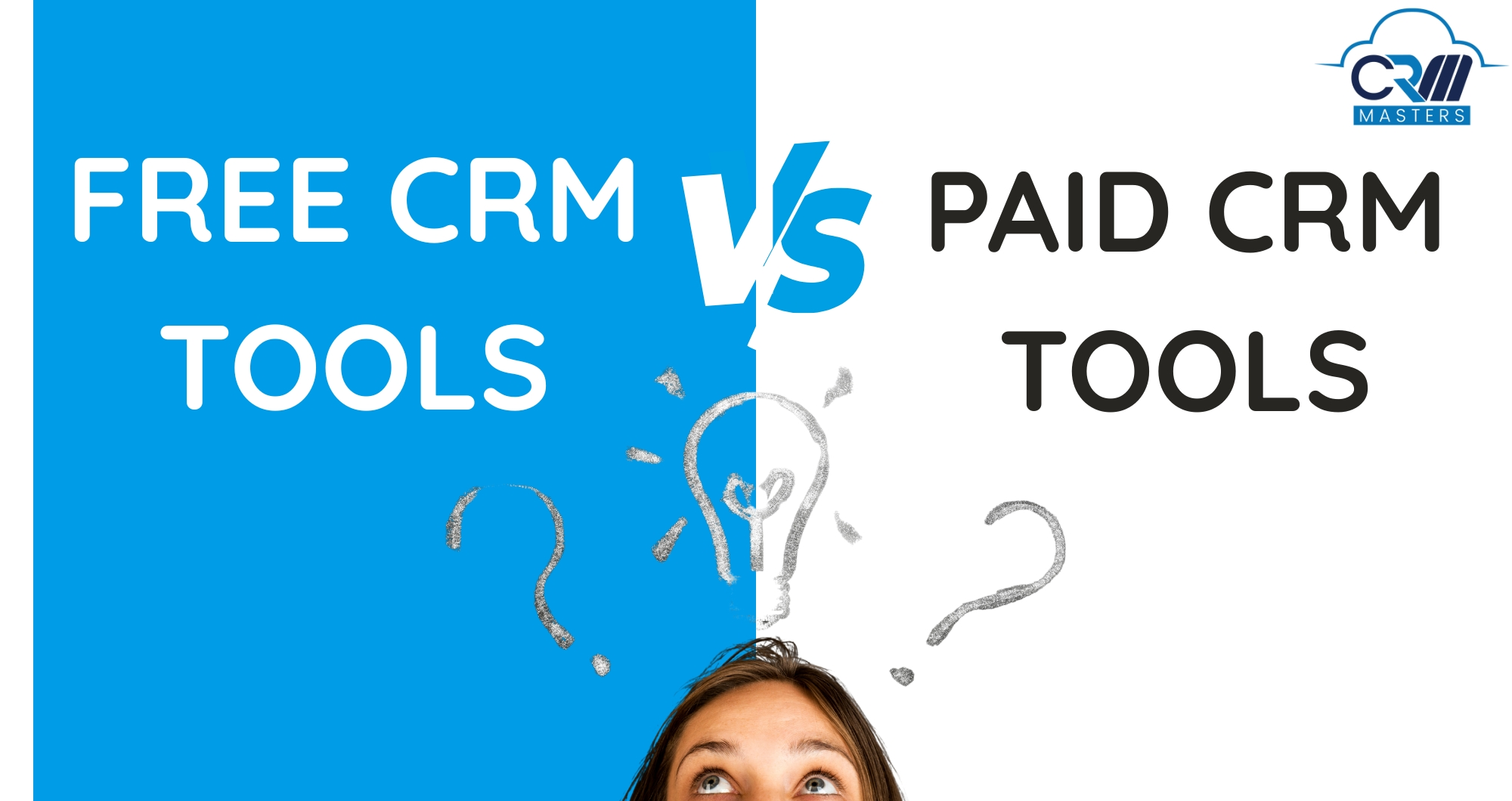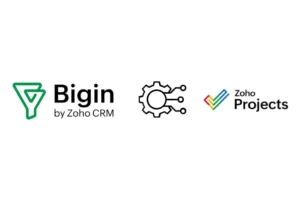
Free Vs Paid CRM Tools: Which One Should Your Business Choose?
Managing customer relationships is essential for growth. Customer relationship management software has emerged as a crucial tool for organizing leads, managing sales pipelines, automating marketing, and enhancing customer service.
But, with numerous CRM options in the market, businesses are always confused with a fundamental question: Should we opt for a free CRM or invest in a paid one?
As a Zoho Implementation Partner, we have experience helping businesses navigate this choice. Zoho CRM offers a fully functional free edition alongside powerful paid plans, catering to startups and growing businesses alike.
This blog explores the differences between free and paid CRM tools, their pros and cons and helps you decide the best CRM for your business.
What Does a CRM Do?
CRM software acts as a centralized system to manage your customer data, interactions and business processes. The main features of CRM include:-
- Contact and lead management
- Sales Pipeline tracking
- Task and activity automation
- Mobile Access
- Reporting and analytics
- Third Party Integration
A good CRM helps your sales and marketing teams work more efficiently, deliver a better customer experience and make smarter decisions based on data.
Also read:- How CRM tools support Sustainable AI development in 2025
Pros and Cons of Free CRM Tools
Free CRM solutions are attractive for startups and small businesses for their zero-cost entry point. They provide the essential functions to get started with organizing customer data and tracking sales without the burden of subscription fees.
Pros of Free CRM Software
- Cost-Effective
- User-Friendly
- Quick Deployment
- Suitable for a small business
Cons of Free CRM Software
- Minimal automation and customization capabilities
- Basic or no advanced reporting and analytics
- Limited integrations with other systems
- User and data caps restricted growth potential
Essentially, free CRMs give you various free CRM benefits, but are not designed for expansion and complex business workflows.
Pros and Cons of Paid CRM Tools
Paid CRM software extends far beyond the basics, offering advanced features that empower businesses to automate, customize and scale their sales and customer engagement processes.
Pros of Paid CRM Software
- Third-Party Integration
- Advanced Customization
- Robust Reporting
- Stronger Security
Cons of Free CRM Software
- Higher Complexity with dedicated user training
- Require a financial commitment-subscription fee can add up
- Risk of overpaying for underutilised features in smaller setups.
Free vs Paid CRM Tools: Which is better for your Business?
When evaluating CRM tools, understanding the key differences between free and paid options will help you determine which one best fits your business needs. Here’s a clear breakdown of the factors that distinguish free CRMs from paid ones.
1. Cost

Free CRM are completely free to use with no subscription charges. This makes them attractive for startups and small teams that need to manage customer relationships without incurring upfront expenses. However, paid CRMs require monthly or annual subscription fees. Though this may seem like an additional cost, paid CRMs deliver advanced capabilities and ongoing support that help justify the investment as your business scales.
2. User Limits
Most free CRMs limit the number of active users you can have. For example, Zoho CRM’s free plan allows you to have up to three users. This suits small teams, but can become a bottleneck as your sales or support teams grow. Paid CRM plans support unlimited or a significantly higher number of users, facilitating collaboration across departments and larger organisations.
3. Feature and Functionality
Free CRM tools like Zoho CRM offer core functionalities such as contact management, simple deal tracking, task reminders, and basic reporting. While these features serve basic sales and customer management needs, they usually lack advanced automation, AI-driven insights, marketing tools or sophisticated analytics. Paid CRMs, in contrast, bring powerful automation workflows, predictive lead scoring, omnichannel communications, and extensive customization options to help optimize processes and improve customer engagement.
4. Customization

With free CRMs, customization options are limited as you may not be able to tweak a few settings or use preset templates. Paid CRMs, however, allow deep customization of workflows, dashboards, modules, and fields so that the CRM perfectly fits your specific sales process, industry or business model.
5. Reporting and Analytics
Basic reporting feature comes standard in free CRMs, showing essential metrics like the number of leads or deals. But paid CRMs provide robust analytics, including pipeline forecasting, sales performance tracking and customer segmentation. These insights equip managers to make data-driven decisions and develop targeted strategies.
6. Integrations
Free CRMs typically have limited integration capabilities and may only connect with a few essential apps, such as email or calendar tools. Paid CRMs offer a broad ecosystem of integrations with ERP, marketing automation, accounting, and e-commerce platforms, and more, creating unified workflows and reducing manual data entry.
7. Support and Service
Customer support for the free CRM users is usually limited to the community forums, standard email support, or self-help resources. Paid CRM subscriptions often include priority support, dedicated account managers, onboarding assistance and live training sessions, ensuring that your team can maximize CRM usage and resolve issues quickly.
8. Scalability
Free CRM solutions are ideal for small businesses or startups with simple sales processes and low volumes of customer data. But as your business grows, these tools can become restrictive. Paid CRMs are designed to scale alongside your organization, able to handle larger teams, extensive customer databases, and more complex business requirements without performance issues.
9. Security and Compliance
Security measures in free CRM tools are generally basic, offering standard encryption and authentication. Paid CRMs prioritize enterprise-grade security features, including role-based access controls, data encryption, audit logs and compliance with industry regulations like GDPR or HIPAA. This is critical for protecting sensitive customer data as your company expands.
10. User Experience
Free CRMs focus on simplicity and ease of use to help beginners get started quickly. In Contrast, paid CRMs provide enhanced interfaces with customizable views, automation triggers, and advanced features that experienced teams can leverage to boost efficiency and productivity.
Also read:- The Role of CRM tools in Lead management for Business Growth
Zoho CRM: The Best of Both Worlds
Zoho CRM stands out as a flexible provider offering a free edition and several paid tiers designed for scaling businesses.
What You Get in Zoho CRM Free Edition
- Up to 3 free users (ideal for startups, freelancers, and very small teams)
- Contact, lead and deal management
- Basic workflow automation
- Standard reporting dashboard
- Multichannel communication
- Mobile app access
- Ad-free user interface
It’s an excellent way for businesses to centrally manage customers without initial costs or risks.
Why Upgrade to a Paid Zoho CRM Plan?
As operations expand, Zoho CRM paid plans provide you:-
- More users and data storage
- Advanced automation
- AI assistant Zia for sales predictions, lead scoring, and suggestions
- Custom modules for industry-specific needs
- Blueprint to automate the complex sales processes
- Comprehensive reporting with forecasts, trend analyses
- Deeper integration across the Zoho Suite, like Zoho Books, Zoho Projects, Zoho Desk and also with third-party tools
- Enhanced Data Security and compliance
This allows businesses to automate workflows, forecast sales accurately, and deliver a personalized customer experience at scale.
How Should Choose between the Free Vs Paid CRM?
Consider the Free CRM for your business if:-
- The business is just starting with a very small team
- Basic contact and lead management are enough
- Budget constraints do not allow for upfront software spending
- The sales process is simple, and automation is minimal
Consider the Paid CRM for your business if:-
- You have multiple team members working together
- Your business requires automation and detailed analytics
- You need extensive customization options
- Integration with other enterprise systems is prioritized
Start Free and Grow with Zoho CRM
There is no specific size-fits-all answer when choosing between free and paid CRMs. Zoho Free edition is perfect for startups and small teams, offering essential features at no cost. As your business grows, upgrading to Zoho’s paid plans gives you advanced automation, AI insights, and powerful integrations that help increase efficiency and sales.
With over 10 years of experience, we provide expert consulting services to help you get the most from Zoho CRM. Whether you are starting or scaling up, we customize and optimize Zoho CRM for your unique needs, making your growth smooth and successful.
Choosing Zoho CRM means choosing a trusted platform and a reliable partner for every step of your business journey!












